让步状语从句
高考英语必考语法让步状语从句
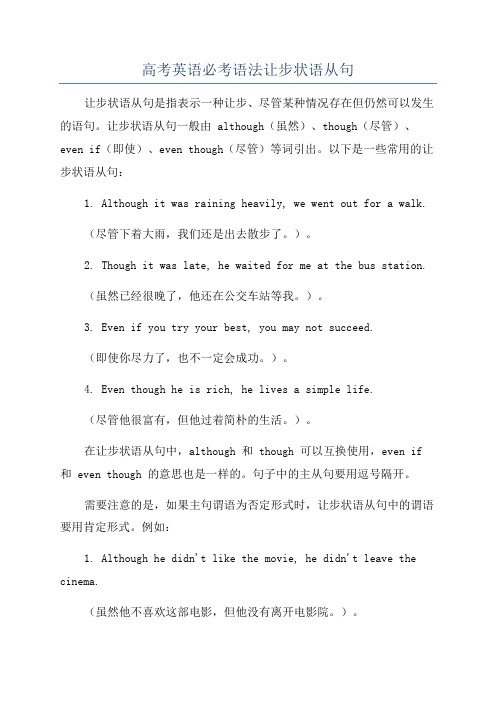
高考英语必考语法让步状语从句让步状语从句是指表示一种让步、尽管某种情况存在但仍然可以发生的语句。
让步状语从句一般由 although(虽然)、though(尽管)、even if(即使)、even though(尽管)等词引出。
以下是一些常用的让步状语从句:1. Although it was raining heavily, we went out for a walk.(尽管下着大雨,我们还是出去散步了。
)。
2. Though it was late, he waited for me at the bus station.(虽然已经很晚了,他还在公交车站等我。
)。
3. Even if you try your best, you may not succeed.(即使你尽力了,也不一定会成功。
)。
4. Even though he is rich, he lives a simple life.(尽管他很富有,但他过着简朴的生活。
)。
在让步状语从句中,although 和 though 可以互换使用,even if 和 even though 的意思也是一样的。
句子中的主从句要用逗号隔开。
需要注意的是,如果主句谓语为否定形式时,让步状语从句中的谓语要用肯定形式。
例如:1. Although he didn't like the movie, he didn't leave the cinema.(虽然他不喜欢这部电影,但他没有离开电影院。
)。
2. Even though he is not very good at English, he enjoys reading English books.(尽管他英语不是很好,但他喜欢读英语书。
)。
以上就是让步状语从句的相关内容,希望对大家有所帮助。
让步状语从句和时间状语从句和转折状语从句
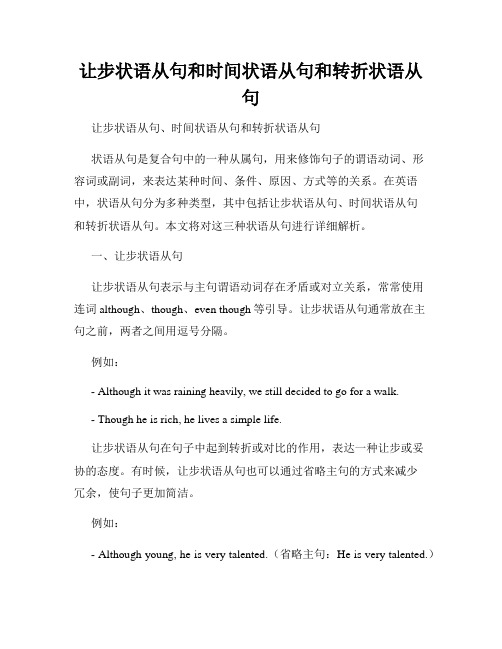
让步状语从句和时间状语从句和转折状语从句让步状语从句、时间状语从句和转折状语从句状语从句是复合句中的一种从属句,用来修饰句子的谓语动词、形容词或副词,来表达某种时间、条件、原因、方式等的关系。
在英语中,状语从句分为多种类型,其中包括让步状语从句、时间状语从句和转折状语从句。
本文将对这三种状语从句进行详细解析。
一、让步状语从句让步状语从句表示与主句谓语动词存在矛盾或对立关系,常常使用连词although、though、even though等引导。
让步状语从句通常放在主句之前,两者之间用逗号分隔。
例如:- Although it was raining heavily, we still decided to go for a walk.- Though he is rich, he lives a simple life.让步状语从句在句子中起到转折或对比的作用,表达一种让步或妥协的态度。
有时候,让步状语从句也可以通过省略主句的方式来减少冗余,使句子更加简洁。
例如:- Although young, he is very talented.(省略主句:He is very talented.)二、时间状语从句时间状语从句用来表示句子中的动作、事件或情况发生的时间,常常使用连词when、while、after、before等引导。
时间状语从句通常放在主句之前或之后,两者之间用逗号或分号分隔。
例如:- When I was a child, I used to play football with my friends.- After she finished her homework, she went to bed.时间状语从句可以表达在主句动作进行期间、之前或之后发生的事件,起到补充或限定主句内容的作用。
根据时间状语从句的引导词和句意,我们可以确定从句所表示的时间关系。
三、转折状语从句转折状语从句用来表示与主句内容相对立或对比的情况,常常使用连词but、yet、however、although等引导。
让步状语从句
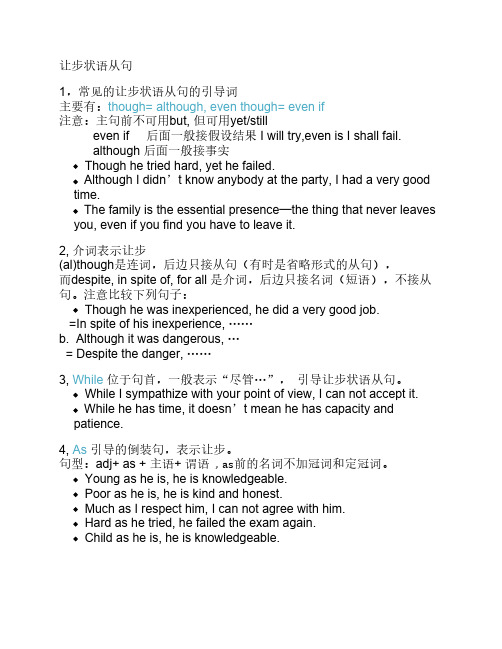
让步状语从句1,常见的让步状语从句的引导词主要有:though= although, even though= even if注意:主句前不可用but, 但可用yet/stilleven if 后面一般接假设结果 I will try,even is I shall fail.although 后面一般接事实Though he tried hard, yet he failed.Although I didn’t know anybody at the party, I had a very good time.The family is the essential presence—the thing that never leaves you, even if you find you have to leave it.2, 介词表示让步(al)though是连词,后边只接从句(有时是省略形式的从句),而despite, in spite of, for all 是介词,后边只接名词(短语),不接从句。
注意比较下列句子:Though he was inexperienced, he did a very good job.=In spite of his inexperience, ……b. Although it was dangerous, …= Despite the danger, ……3, While 位于句首,一般表示“尽管…”, 引导让步状语从句。
While I sympathize with your point of view, I can not accept it.While he has time, it doesn’t mean he has capacity andpatience.4, As引导的倒装句,表示让步。
句型:adj+ as + 主语+ 谓语 ,as前的名词不加冠词和定冠词。
让步状语从句
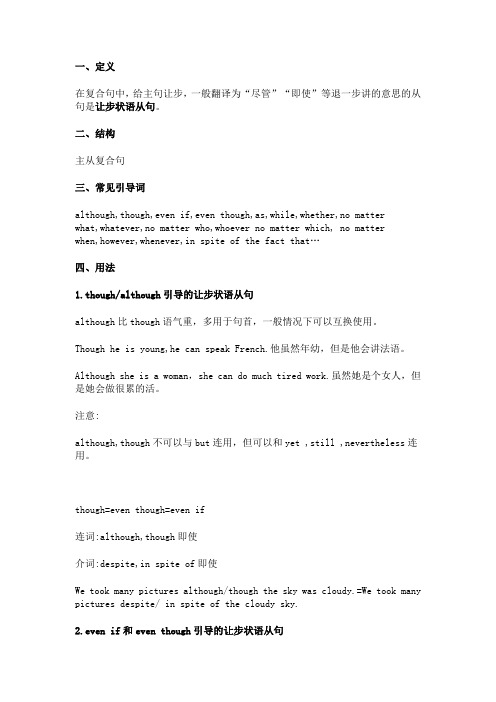
一、定义在复合句中,给主句让步,一般翻译为“尽管”“即使”等退一步讲的意思的从句是让步状语从句。
二、结构主从复合句三、常见引导词although,though,even if,even though,as,while,whether,no matterwhat,whatever,no matter who,whoever no matter which, no matter when,however,whenever,in spite of the fact that…四、用法1.though/although引导的让步状语从句although比though语气重,多用于句首,一般情况下可以互换使用。
Though he is young,he can speak French.他虽然年幼,但是他会讲法语。
Although she is a woman,she can do much tired work.虽然她是个女人,但是她会做很累的活。
注意:although,though不可以与but连用,但可以和yet ,still ,nevertheless连用。
though=even though=even if连词:although,though即使介词:despite,in spite of即使We took many pictures although/though the sky was cloudy.=We took many pictures despite/ in spite of the cloudy sky.2.even if和even though引导的让步状语从句Even if/though I am a woman,I will work like a man.即使我是个女人,我也会像男人一样去工作。
3.as和though引导的倒装式让步状语从句as必须用倒装结构,though可用也可不用倒装结构。
英语让步状语从句
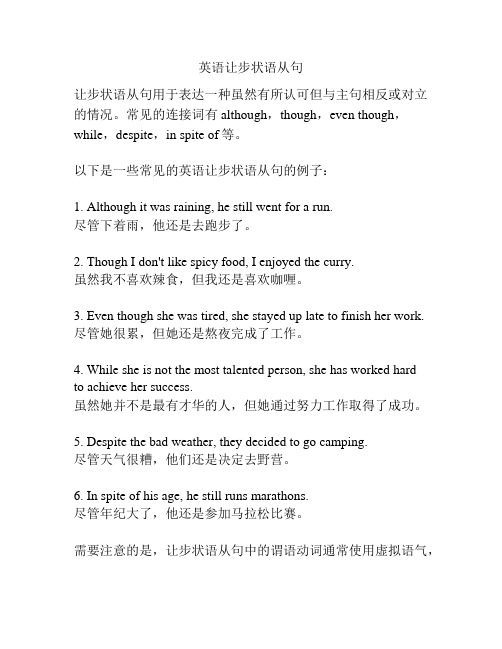
英语让步状语从句
让步状语从句用于表达一种虽然有所认可但与主句相反或对立的情况。
常见的连接词有although,though,even though,while,despite,in spite of等。
以下是一些常见的英语让步状语从句的例子:
1. Although it was raining, he still went for a run.
尽管下着雨,他还是去跑步了。
2. Though I don't like spicy food, I enjoyed the curry.
虽然我不喜欢辣食,但我还是喜欢咖喱。
3. Even though she was tired, she stayed up late to finish her work. 尽管她很累,但她还是熬夜完成了工作。
4. While she is not the most talented person, she has worked hard
to achieve her success.
虽然她并不是最有才华的人,但她通过努力工作取得了成功。
5. Despite the bad weather, they decided to go camping.
尽管天气很糟,他们还是决定去野营。
6. In spite of his age, he still runs marathons.
尽管年纪大了,他还是参加马拉松比赛。
需要注意的是,让步状语从句中的谓语动词通常使用虚拟语气,
即主语与谓语动词形式不一致。
例如,尽管是过去时的情况,谓语动词仍然使用了现在时的形式。
让步状语从句
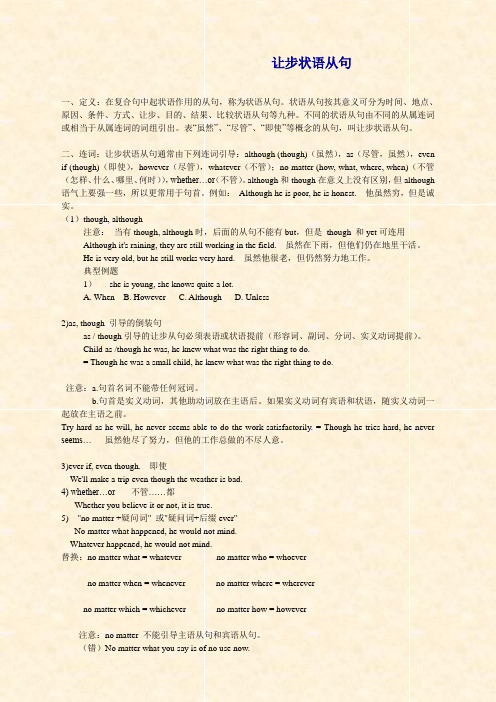
让步状语从句一、定义:在复合句中起状语作用的从句,称为状语从句。
状语从句按其意义可分为时间、地点、原因、条件、方式、让步、目的、结果、比较状语从句等九种。
不同的状语从句由不同的从属连词或相当于从属连词的词组引出。
表“虽然”、“尽管”、“即使”等概念的从句,叫让步状语从句。
二、连词:让步状语从句通常由下列连词引导:although (though)(虽然),as(尽管,虽然),even if (though)(即使),however(尽管),whatever(不管);no matter (how, what, where, when)(不管(怎样、什么、哪里、何时)),whether…or(不管)。
although和though在意义上没有区别,但although 语气上要强一些,所以更常用于句首。
例如:Although he is poor, he is honest. 他虽然穷,但是诚实。
(1)though, although注意:当有though, although时,后面的从句不能有but,但是though 和yet可连用Although it's raining, they are still working in the field.虽然在下雨,但他们仍在地里干活。
He is very old, but he still works very hard.虽然他很老,但仍然努力地工作。
典型例题1)___she is young, she knows quite a lot.A. WhenB. HoweverC. AlthoughD. Unless2)as, though 引导的倒装句as / though引导的让步从句必须表语或状语提前(形容词、副词、分词、实义动词提前)。
Child as /though he was, he knew what was the right thing to do.= Though he was a small child, he knew what was the right thing to do.注意:a.句首名词不能带任何冠词。
让步状语从句知识点归纳
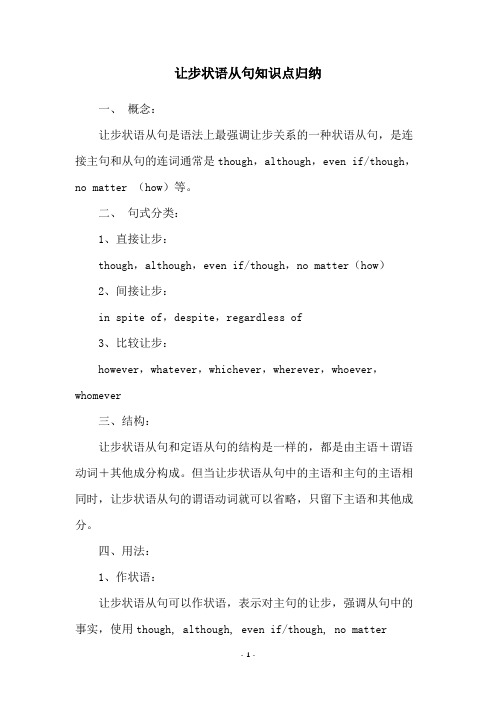
让步状语从句知识点归纳一、 概念:让步状语从句是语法上最强调让步关系的一种状语从句,是连接主句和从句的连词通常是though,although,even if/though,no matter (how)等。
二、 句式分类:1、直接让步:though,although,even if/though,no matter(how)2、间接让步:in spite of,despite,regardless of3、比较让步:however,whatever,whichever,wherever,whoever,whomever三、结构:让步状语从句和定语从句的结构是一样的,都是由主语+谓语动词+其他成分构成。
但当让步状语从句中的主语和主句的主语相同时,让步状语从句的谓语动词就可以省略,只留下主语和其他成分。
四、用法:1、作状语:让步状语从句可以作状语,表示对主句的让步,强调从句中的事实,使用though, although, even if/though, no matter(how) 等连接,表示主句中的事情比较强烈,但从句中的事情仍然存在。
2、作宾语:让步状语从句可以作宾语,表示对主句的让步,强调主句中的事实。
此时,通常由in spite of, despite, regardless of来引导。
3、作定语:让步状语从句可以作定语,表示对主句中的定语进行让步,此时,一般用however, whatever, whichever, wherever, whoever,whomever等来引导。
五、特殊情况:1、如果让步状语从句主语和主句的主语相同,那么让步状语从句的谓语就可以省略,只留下主语和其他成分。
2、有时候,让步状语从句主语和主句的主语不一定相同,也可以省略谓语动词,只留下主语和其他成分,但这种情况比较少见。
3、如果让步状语从句是一个主句,且主句的谓语动词为实义动词,则不能省略谓语动词。
让步状语从句

让步状语从句让步状语从句是指一个句子发生在某一个时态,句子本身就是状语从句,这个状语从句让了一步给主句,一般翻译为“尽管…”“即使…”,常与though, while, as搭配。
引导让步状语从句的连词主要有以下这些:though, although, while, as, even if, even though, despite等等。
但although不可与but连用。
1. though, although表示“虽然,纵然”之意, although比though正式,二者都可与yet, still或never,the less连用,但不能与but连用eg. Although/Though he was exhausted, (still) he kept on working.2. as, though表示“虽然……但是”,“纵使……”之意。
as引导的让步状语从句必须以部分倒装的形式出现,被倒装的部分可以是表语、状语或动词原形。
eg. Object as you may, I’ll go.(=Though/Although you may object, I’ll go.)3. even if, even though 表示“即使……”,“纵使……”之意, 表示假设,even if引导的让步从句含有强烈的假定性,可用来表示与事实相反的假设,但不能用来描述已经发生的事实.而even though引导让步状语从句时,是以从句的内容为先决条件的,即说话人肯定了从句的事实,表示已经发生了的事. eg. We’ll make a trip even if the weather is bad.We made a trip even though the weather was bad.4. whether...or...表示“不论是否……”,“不管是……还是……”之意。
eg. Whether you believe it or not, it's true.5.“no matter+疑问词”或“疑问词-ever”的含义为“……都……;不管……都…"。
让步状语从句
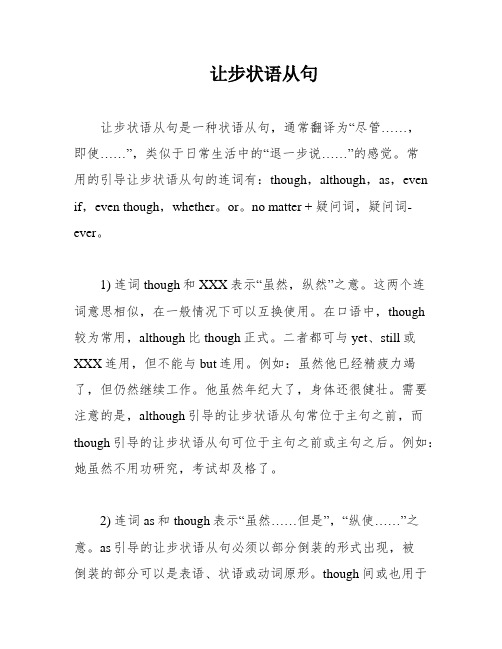
让步状语从句让步状语从句是一种状语从句,通常翻译为“尽管……,即使……”,类似于日常生活中的“退一步说……”的感觉。
常用的引导让步状语从句的连词有:though,although,as,even if,even though,whether。
or。
no matter + 疑问词,疑问词-ever。
1) 连词though和XXX表示“虽然,纵然”之意。
这两个连词意思相似,在一般情况下可以互换使用。
在口语中,though较为常用,although比though正式。
二者都可与yet、still或XXX连用,但不能与but连用。
例如:虽然他已经精疲力竭了,但仍然继续工作。
他虽然年纪大了,身体还很健壮。
需要注意的是,although引导的让步状语从句常位于主句之前,而though引导的让步状语从句可位于主句之前或主句之后。
例如:她虽然不用功研究,考试却及格了。
2) 连词as和though表示“虽然……但是”,“纵使……”之意。
as引导的让步状语从句必须以部分倒装的形式出现,被倒装的部分可以是表语、状语或动词原形。
though间或也用于这样的结构中,但XXX不可以这样使用。
例如:反对,我也要去。
尽管他研究很努力,但几乎没取得什么进步。
虽然他是一个孩子,但他知道该做什么。
Reading a book takes time。
no matter how fast you read。
Even if you read quickly。
XXX。
XXX "even if" and "even though" both mean "even if" or "although"。
They are often interchangeable。
but there is a XXX by "even if" has a strong hypothetical nature。
什么是让步状语从句
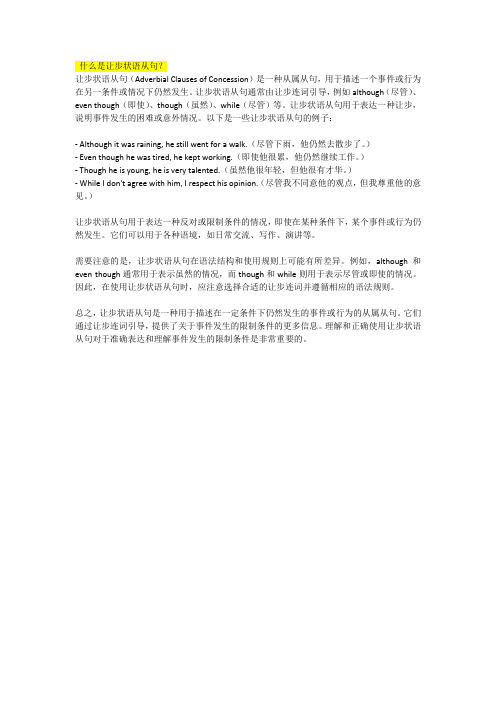
什么是让步状语从句?让步状语从句(Adverbial Clauses of Concession)是一种从属从句,用于描述一个事件或行为在另一条件或情况下仍然发生。
让步状语从句通常由让步连词引导,例如although(尽管)、even though(即使)、though(虽然)、while(尽管)等。
让步状语从句用于表达一种让步,说明事件发生的困难或意外情况。
以下是一些让步状语从句的例子:- Although it was raining, he still went for a walk.(尽管下雨,他仍然去散步了。
)- Even though he was tired, he kept working.(即使他很累,他仍然继续工作。
)- Though he is young, he is very talented.(虽然他很年轻,但他很有才华。
)- While I don't agree with him, I respect his opinion.(尽管我不同意他的观点,但我尊重他的意见。
)让步状语从句用于表达一种反对或限制条件的情况,即使在某种条件下,某个事件或行为仍然发生。
它们可以用于各种语境,如日常交流、写作、演讲等。
需要注意的是,让步状语从句在语法结构和使用规则上可能有所差异。
例如,although和even though通常用于表示虽然的情况,而though和while则用于表示尽管或即使的情况。
因此,在使用让步状语从句时,应注意选择合适的让步连词并遵循相应的语法规则。
总之,让步状语从句是一种用于描述在一定条件下仍然发生的事件或行为的从属从句。
它们通过让步连词引导,提供了关于事件发生的限制条件的更多信息。
理解和正确使用让步状语从句对于准确表达和理解事件发生的限制条件是非常重要的。
55第五章 让步状语从句

第五章 | 让步状语从句,今天这篇文章是要教大家顿悟让步状语从句。
语法名词:让步状语从句核心讲解:让步状语从句表示的是,“虽然”或者“即使”从句中的状态不够理想,但主句的动作仍会发生或存在,最常见的引导词是though/although。
我们先来看一个例子:1. 虽然人们可能更富有或更贫穷,但是所有人享有同样的权力。
Although/though people may be richer or poorer, all of them enjoy the same right.这个句子的让步状语从句由although引导,可以和though互换,都意为“尽管,虽然”。
在中文中,当出现“尽管”时,后文通常会加上“但是”,不过在英语中忌讳如此,当从句由“although/though”引导时,主句不能出现“but”。
我们再看一个例子:2. 即使我们承认竞争的好处,我们也要保护一些重要的行业。
Even if/though we admit the advantages of competition,we still need to protect some important industries.这个句子的引导词可以是Even if,也可以是Even though,都意为“即使”。
让步状语从句的引导词还有很多,如while(虽然); whether...or...(不论是否...); no matter+疑问词(不管...都), 疑问词-ever(不管...都),;regardless of+名词/名词短语/名词从句(不管...);despite(尽管), in spite of(尽管)等。
要点拓展:一、though/although 虽然,尽管1. Although/Though Tony was ill, he (still) went to school.虽然托尼生病了,但他还是去上学了。
2. Although/Though Kate is fat, she runs fast.虽然凯特很胖,但她还是跑得很快。
让步状语从句是什么意思_状语从句顺口溜是什么
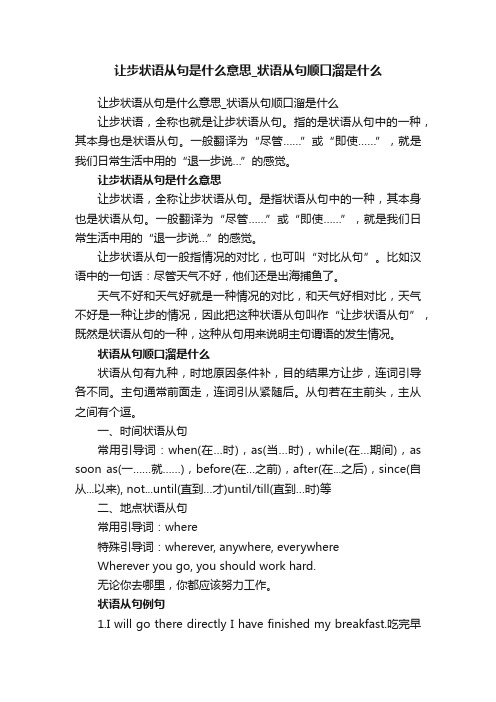
让步状语从句是什么意思_状语从句顺口溜是什么让步状语从句是什么意思_状语从句顺口溜是什么让步状语,全称也就是让步状语从句。
指的是状语从句中的一种,其本身也是状语从句。
一般翻译为“尽管……”或“即使……”,就是我们日常生活中用的“退一步说…”的感觉。
让步状语从句是什么意思让步状语,全称让步状语从句。
是指状语从句中的一种,其本身也是状语从句。
一般翻译为“尽管……”或“即使……”,就是我们日常生活中用的“退一步说…”的感觉。
让步状语从句一般指情况的对比,也可叫“对比从句”。
比如汉语中的一句话:尽管天气不好,他们还是出海捕鱼了。
天气不好和天气好就是一种情况的对比,和天气好相对比,天气不好是一种让步的情况,因此把这种状语从句叫作“让步状语从句”,既然是状语从句的一种,这种从句用来说明主句谓语的发生情况。
状语从句顺口溜是什么状语从句有九种,时地原因条件补,目的结果方让步,连词引导各不同。
主句通常前面走,连词引从紧随后。
从句若在主前头,主从之间有个逗。
一、时间状语从句常用引导词:when(在…时),as(当…时),while(在…期间),as soon as(一……就……),before(在…之前),after(在...之后),since(自从...以来), not...until(直到…才)until/till(直到…时)等二、地点状语从句常用引导词:where特殊引导词:wherever, anywhere, everywhereWherever you go, you should work hard.无论你去哪里,你都应该努力工作。
状语从句例句1.I will go there directly I have finished my breakfast.吃完早饭,我立即到那里去。
2.The moment I heard the news, I hastened to the spot.我一听到消息,马上赶到了出事地点。
中考英语常见考点:让步状语从句

中考英语常见考点:让步状语从句知识点总结一、让步状语从句所谓让步,就是我们日常生活中“退一步说……”的意思,有一种转折关系在里面。
引导让步状语从句的连词主要有以下这些:though, although,while, as; even if, even though; whether...or...; no matter+疑问词,疑问词-ever,一般翻译为“尽管……”或“即使……”,“无论……”。
用法如下:1、though, although表示“虽然,纵然”之意。
这两个连词意思大致相同,在一般情况下可以互换使用。
在口语中,though较常使用,although比though正式,二者都可与yet, still或never,the less连用,但不能与but连用。
例如:Although/Though he is very old, (yet) he is quite strong. 他虽然年纪大了,身体还很健壮。
值得注意的是,although引导的让步状语从句位于主句之前的情况较多,though引导的让步状语从句可位于主句之前或主句之后。
2、as,though表示“虽然……但是”,“纵使……”之意。
as 引导的让步状语从句必须以部分倒装的形式出现,被倒装的部分可以是表语、状语或动词原形,though也可用于这样的结构中,但although不可以这样用。
例如:Hard as/ though he works, he makes little progress. (=Though he works hard, he makes little progress.)尽管他学习很努力,但几乎没取得什么进步。
3、 even if, even though 表示“即使……”,“纵使……”之意,含有一种假设。
这两个复合连词的意思基本相同。
它们常互换使用,但意义有细微差别。
even if引导的让步从句含有强烈的假定性,可用来表示与事实相反的假设,但不能用来描述已经发生的事实。
六种常见的让步状语从句例析

六种常见的让步状语从句例析英语中的让步状语从句多种多样。
本文将对其作一概括和剖析。
1.由although 或though 引导的让步状语从句。
这两个词都不能同时与but连用,但可以与yet 连用。
Though 引导让步状语从句时,可将从句中的表语提到though的火线。
比方:Although he is young, he knows a great deal. 纵然他很年轻,但他明白很多。
Smart though he is, he doesn’t study hard.纵然他很聪明,但他学习不下工夫。
2.由as 引导的让步状语从句。
这种让步状语从句通常以以下几种形式出现:1)名词/形容词/已往分词+as+主语+/be/别的动词。
前置的表语为名词时,其前往往不带冠词。
比方:Impressive as the record is, it fades next to the story of Armstrong’s struggle against diseases.纵然这项记载给人的印象深刻,但不如阿姆斯特朗同疾病作斗争的故事令人瞩目。
Well paid as he was, he often ended up in financial trouble.纵然他人为很高,但通常入不敷出。
Teenager as he is, he knows a great deal. 纵然他是个十几岁的孩子,他知道的工具却很多。
Hero as he is, he has shortcomings. 纵然他是个英雄人物,但他也有缺点。
2)副词+as+主语+谓语+其他成分。
比方:Much as I like this book, I will let you read it first.纵然我特殊喜欢这本书,但我还是想让你先读一读。
注:若从句中没有副词,可以将谓语部分中的主动词提到as火线,再在主语后面加may/might/can/could/will/would等情态动词或助动词do/did/does等。
- 1、下载文档前请自行甄别文档内容的完整性,平台不提供额外的编辑、内容补充、找答案等附加服务。
- 2、"仅部分预览"的文档,不可在线预览部分如存在完整性等问题,可反馈申请退款(可完整预览的文档不适用该条件!)。
- 3、如文档侵犯您的权益,请联系客服反馈,我们会尽快为您处理(人工客服工作时间:9:00-18:30)。
(4)whether...or...表示“不论是否……”,“不管 是……还是……”之意。
由这一个复合连词引导的让步状语从句旨在说明正反两个方面的可 能性都不会影响主句的意向或结果。例如: You'll have to attend the ceremony whether you're free or busy. 不管你 忙不忙,都要参加这个典礼。 Whether you believe it or not, it's true.无论你是否相信,这都是真的。
Exercises
1 The lawyer seldom wears anything other than a suit ____the season A whatever B wherever C whenever D however 2 Many of them turned a deaf ear to his advice, ____they knew it to be valuable. A as if B now that C even though D so that
Grammar
1.Adverbial clause of concession
pound
1. It will bring you into a magical world and make your dreams come true, whether traveling through space, visiting a pirate ship or meeting your favourite fairy tale or Disney cartoon character.
A. chemistry B. chemical C. chemist D. physician
5.The three- ________chair isn’t suitable for a young child. He may fall off. A. legging B. legged C. legs D. leged 1-5 BDACB
Exercises
1. That man was ________enough not to tell the manager that he would not do the job. A. careB. carefulC. carelessD. carelessness
2. The soldier died for saving the child,so his________ is heavier than Mount Tai.
(1)though,ቤተ መጻሕፍቲ ባይዱalthough表示“虽然,纵然” 之意。
这两个连词意思大致相同,在一般情况下可以互换使用。 在口语中,though较常使用,although比though正式,二者 都可与yet, still或nevertheless连用,但不能与but连用。 eg:Although/Though he was worn out, (still) he kept on working. 虽然他已经精疲力竭了,但仍然继续工作。
A. die B. dead C. died D. death 3. The child looked________at his brother who was badly wounded. A. sadly B. sadness C. saddly D. sad 4. He is an expert at chemistry. We all call him a ________.
3. 合成动词及合成副词:
副词+动词”组成的,这里“副词”多半表示动作的方向、程度等等。如:out表示超 过 to outnumber(超过数目)to out-talk(压过别人的声音);under表示不足、在下 to underdevelop(发育不全)to underestimate(估计不足)to underline(行下划线) 等等。
A As B If C While D When
1--5 ACDDC
Compound
compound nouns in passage
1. 合成名词
(1) n+n air conditioner 空调 blood pressure血压 income tax 所得税 credit card 信用卡 (2) adj + n central bank 中央银行fast food 快餐 solar system 太阳系 remote control 遥控 (3) v-ing +另一词 washing machine 洗衣 driving license 驾驶执照 (4) 其他方式 by-product 副产品 editor-in-chief 主编
2. Whichever and whatever you like, there is a theme park for you!
让步状语从句是状语从句中的一种,其本身也是状语从句。
一般翻译为“尽管……即使……”就是我们日常生活中用的“退一步说……”的感觉。 引导让步状语从句的连词主要有以下这些:though, although, as; even if, even though; whether...or...; no matter+疑问词,疑问词-ever。
4.前缀和后缀
前缀 dis-(否定):agree(同意) disagree(不同意) un-(不):happy(高兴) unhappy(不高兴);able(能够) unable(不能) in-(il-, im-, ir-)(非,不) ⑵后缀 构成名词的后缀: -er: buy(买) buyer(买主); -ese: Janan(日本) apanese(日本人); -ist: social(社会) socialist(社会主义者); -th: true( 真实的) truth(真理); -ian: music(音乐)à musician(音乐家); -ness: ill(有病的) illness(病); -ment: agree(同意) agreement(同意); -tion: collect( 收集) collection(收集) 构成形容词的后缀: -al: nation(民族) national(民族的); -ful: care(小心) careful(小心的) -y: cloud(云) cloudy(多云的) -ing: excite(使…兴奋) exciting(兴奋的) 构成动词的后缀: -fy: beauty(美丽) beautify(美化); -is(z)e: real(真的) realize(实现) 构成副词的后缀: -ly: easy(容易的) easily(容易地)
3 ____I really don't like art, I find his work impressive.
A As B Since C If D While 4 ____he has limited technical knowledge, the old worker has a lot of experience. A Since B Unless C As D Although 5 ____I have some sympathy for them, I don't think they are right to do so.
2. 合成形容词
(1)形容词+名词:形容词和名词连用,原是短语,用做定语。固定下来,成为形容词, 有的还只是nonce-words,也有合成名词作定语或转成形容词的情形:如full-time worker (全职工)、long-range gun(远程炮)等。 (2)形容词+形容词:这类词不算多,前面的形容词大都进一步说明后面的形容词,如: light-blue(浅蓝)、dead-alive(半死不活)。 (3)名词+过去分词:有被动意味,名词相当于前置词宾语,表示工具,行为者等, 如:man-made(人造的),moth-eaten(虫蛀的)。 (4)名词+现在分词:有主动意味,名词大都相当于行为的宾语,如:Englishspeaking people(说英语的人),peace-loving(热爱和平的) (5)形容词+现在分词:有主动意味,形容词相当于表语或者定语,如eagerseeming(样子急切),easy-going(随和的) (6)副词+分词:如half-baked(幼稚的),far-seeing(有远见的) (7)副词+形容词:over-anxious(过急),all-round athlete(全能选手) (8)名词+形容词:名词大都作比喻的对象,如cock-sure(自恃),paper-thin(薄如纸)
(5)“no matter+疑问词”或“疑问词-ever”的含义 为“……都……;不管……都……”,它们引导的让 步状语从句可以互换。
eg:No matter what happened, he would not mind. (=Whatever happened, he would not mind.)无论发生了什么,他都不会介意的。 eg:No matter who you are, you must keep the law.(=Whoever you are, you must keep the law.不管你是谁,你都要遵纪守法。 此外,有时while也可以引导让步状语从句,但一般要位于句首。 eg:While I like the colour, I don't like the shape.我虽然喜欢那颜色,但 不喜欢那形状。
(3)as, though表示“虽然……但是”,“纵使……” 之意。
as引导的让步状语从句必须以部分倒装的形式出现,被倒装的部分 可以是表语、状语或动词原形,though间或也用于这样的结构中,但 although不可以这样用。例如: Object as you may, I’ll go.(=Though/Although you may object, I’ll go.) 纵使你反对,我也要去。 Hard as/ though he works, he makes little progress. (=Though he works hard, he makes little progress.)尽管他学习很努力,但几乎没取得什么进 步。 Child as/though he was, he knew what was the right thing to do. (=Though he was a child, he knew what was the right thing to do.)虽 然他是一个孩子,但他知道该做什么。 Fast as you read, you can’t finish the book so soon. 纵然你读得快, 你也不能这么快读完这本书。
